Who pays for the Canadian Forces nowadays – the offshore monarchy or the people of Canada (and Quebec)?
Aug 20th, 2012 | By Randall White | Category: Canadian Republic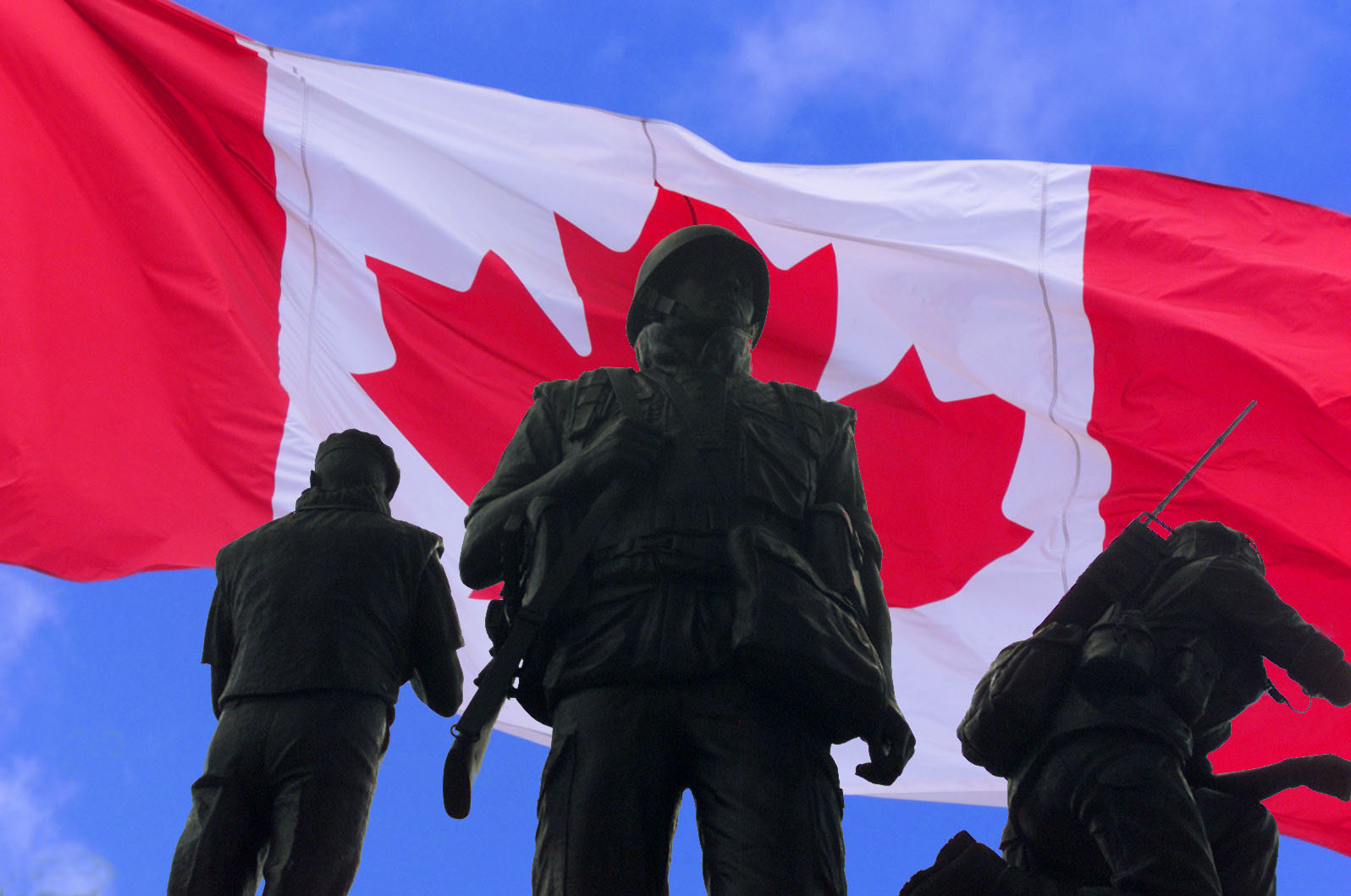 This past Friday the Victoria Times Colonist published a piece by Murray Brewster of the Canadian Press, entitled “Royal branding of Canadian Forces to be extended … Suggestions for smaller branches forwarded for approval to Queen.”
This past Friday the Victoria Times Colonist published a piece by Murray Brewster of the Canadian Press, entitled “Royal branding of Canadian Forces to be extended … Suggestions for smaller branches forwarded for approval to Queen.”
As Mr. Brewster has explained: “Restoring the ‘Royal’ prefix to the navy and air force has … become a huge point of pride for the Harper government, which billed the move as one that would help today’s soldiers, sailors and aircrew connect with their storied history.” Now “a series of briefing notes prepared for the country’s top military commanders show that subordinate commands – the smaller subsets of the Royal Canadian Navy, the Royal Canadian Air Force and the Canadian Army – are next.”
Such “sub-commands” as “engineers, signallers and logisticians” will apparently soon be adding the “Royal” prefix to their official names as well.
Mr. Brewster goes on: “The military’s seemingly single-minded focus on being associated with the monarchy may strike Canadians – especially younger ones who’ve grown up with modern multiculturalism – as a bit odd, or even unimportant … But in an interview last winter, the commander of the Royal Canadian Navy said the attraction rests in tradition and being able to connect with one’s roots.”
Yet both the Harper government and Canada’s military brass in Ottawa might want to consider the results of a Harris/Decima poll taken just this past May. It asked more than 2,000Â representative Canadians whether they agreed or disagreed “that Canada’s Constitution should be changed to make Canada a fully independent country by retiring the British monarchy as Head of Canada’s federal and provincial governments.”
Canada-wide, some 52% of all Canadians agreed – while only 43% disagreed. In the French-speaking-majority province of Quebec the results were “more strikingly one-sided.” Some 76% of all Quebec respondents agreed that the British monarchy in Canada should be retired, and only 17% disagreed.
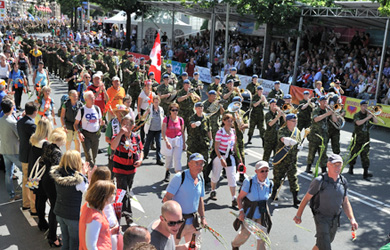
The Canadian contingent for the 2012 Nijmegen Marches march down the main street of Nijmegen in the Netherlands, in the annual “victory parade” which takes place after the marches are completed every year.
Both the Harper government and Canada’s military brass in Ottawa might also want to reflect a bit about just who pays the salaries of the Canadian forces nowadays. It is true enough that Canada was once a colony of Great Britain. And even the Canadian confederation of 1867 was merely the first self-governing dominion of the British empire.
But 145 years is a long time. Many things have changed since the days of John A. Macdonald. The first Canadian Citizenship Act of 1947 (and its extension in 1977), eg, has meant that we former British subjects resident in Canada have become Canadian citizens. According to the Constitution Act, 1982, Canada today is “a free and democratic society.”And for a very long time now the British monarchy has not paid anything at all in support of the defence of Canada.
* * * *
Similarly, the Harris-Decima poll of May 2012 is just the latest such survey to show that at least a small – and in the longer term almost certainly growing – majority of multicultural Canadians would like to (politely of course) retire the now strictly symbolic traditional role of the British monarchy, in the free and democratic society of Canada today.
Mr. Harper’s strategists may say this doesn’t matter. His new Conservative Party has shown that you can win a majority of seats in Canada’s federal Parliament with less than 40% of the Canada-wide popular vote – and hardly any seats in Quebec, the ancient homeland of the first people who called themselves Canadians. (If you really want to talk about “tradition and being able to connect with one’s roots” and plugging into your real “storied history”).
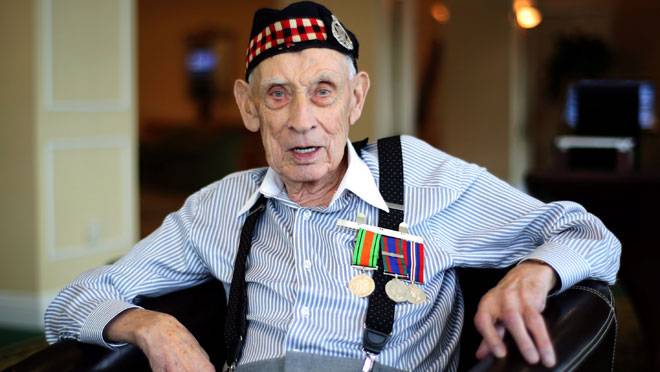
World War II veteran Arthur Rossell, who returnedto Dieppe to mark the 70th anniversary of the ill-fated raid. (PATRICK DOYLE / CP).
The trouble is that the Canada Stephen Harper is trying to build in this way is not a real country of the future, with serious prospects of making it even halfway through the 21st century. As no less a conservative (and Conservative?) than John Ibbitson at the Globe and Mail has recently pointed out, if Pauline Marois’ Parti Québécois actually does win the Quebec election this coming September 4, and eventually does hold yet another Quebec sovereignty referendum, there “is no leader of stature who could make the case for Canada to Quebeckers from within the ranks of the Conservative Party.”
(And Ms. Marois has already made clear what she thinks about Mr. Harper’s allegedly strategic attachments to the monarchist minority in Canada today. See, eg, “Easy to see why Pauline Marois attacks British monarchy in Canada .. big majority of all Quebecers want to end it,” on this website, this past August 7.)
Canadians today are similarly justly proud of the sacrifices Canadian soldiers have made, standing up for the international principles of the free and democratic society in Afghanistan. But the symbolism that has stiffened and stood up for this display of present-day patriotic gore has had very little to do with the ancient rites of the British monarchy and the now vanished British empire in Canada – and everything to do with the independent Canadian maple leaf flag that Lester Pearson’s government finally gave the new Canadian citizenry in 1965.
Canadians today are also justly proud of “the seven veterans, now all in their 90s” who have just been “in northwest France to attend the commemorative ceremonies” for the 70th anniversary of the ill-fated Dieppe Raid of August 19, 1942, during some of the darkest Canadian days of the Second World War.
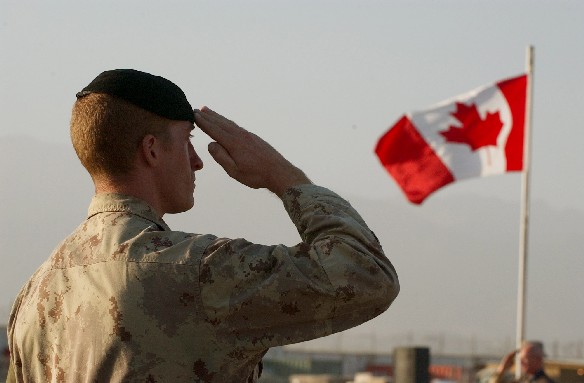 These veterans, of course, did fight for a Canada that still did not have its own independent maple leaf flag, and was indeed still very wrapped up in the lands of hope and glory that made up the global empire on which the sun never dared to set.
These veterans, of course, did fight for a Canada that still did not have its own independent maple leaf flag, and was indeed still very wrapped up in the lands of hope and glory that made up the global empire on which the sun never dared to set.
Yet, on August 19, 2012, in his speech on the 70th anniversary of the Dieppe raid, in the Square du Canada, to his great credit Governor General David Johnston, the commander-in-chief of the Canadian Forces, “discussed how the Battle of Dieppe helped forge a unique connection between Canada and France … Acknowledging the losses during the 1942 raid, Johnston noted how Canadian infantrymen returned two years later to liberate the coastal town … He ended his speech by encouraging young Canadians to listen to the stories of war veterans, and continue nurturing the nation’s unique relationship with France.”
As the recent media reports also explain, the “Square du Canada is a small park in Dieppe, with a plaque commemorating the raid … Part of its inscription reads: ‘…our Canadian cousins / marked with their blood / the road to our final liberation / foretelling thus their victorious return.’”
In fact, the British monarchy has very little to do with all this “storied history.” The “nation’s unique relationship with France” was the work of Canadian soldiers in the first half of the 1940s – and of course stretches much further back, to the 16th and 17th centuries, when the first people who called themselves Canadians put down the Canadian roots and tradition that the British monarchy has too often served to obscure.
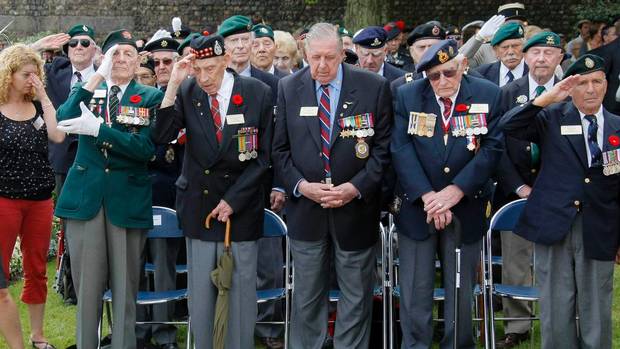
Left to right, Dieppe veterans Fred Engelbretch, 92, Arthur Rossel, 92 of Brampton in Ontario, Roy Wozniak, 93, Russ Burrows, 93 of Picton in Ontario, and David Lloyd Hart, 95 are seen during the commemorations to honor Allied soldiers killed 70 years ago in a failed World War II invasion, in Dieppe, northern France, Sunday Aug. 19, 2012. (Michel Spingler/AP).
There is another troubling aspect of the current enthusiasm of the military brass in Ottawa for reviving their old colonial connections to the offshore monarchy in the present day and age. It makes it seem that they are somehow still accountable, first and foremost, to the monarch in Buckingham Palace far away, and not to the Canadian people and taxpayers who pay their salaries.
And nowadays, of course, the British monarch has absolutely nothing of any practical consequence to do with the Government of Canada (and its Provinces). And it is all too easy to imagine that in re-focusing their symbolic accountability on the monarchy in another country, across the seas, senior Canadian military officers are just trying to pretend that they are finally accountable to no one and nothing but themselves! Which is definitely not the way things are supposed to be, in the free and democratic society alluded to in the Constitution Act, 1982.
CWEDITOR’S NOTE: For another example of “tradition and being able to connect with one’s roots,” and plugging into our real “storied history” in Canada, see the short Canadian Republican Network video, “Remembering Lount and Matthews : The Struggle Continues …”
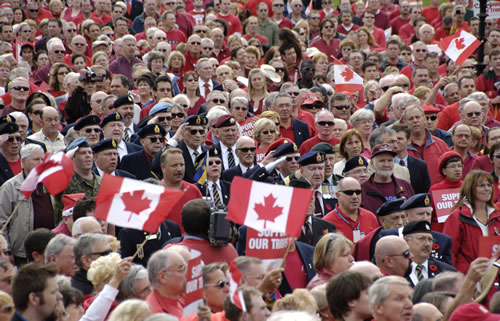
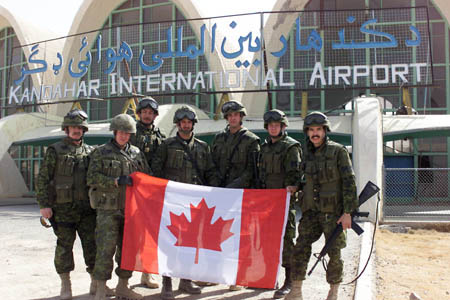


God bless all those who fought and gave their lives for freedom.